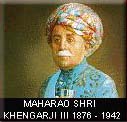|
The
touch of modernization in Kutch
After
Deshalji, when Pragmalji II came to power, the trend of state funded education
started. The civil and army laws were framed and from 1860 to 1875 his
rule came to an end.
In the
meanwhile modernization set foot in Kutch with the appointment of Non
Kutchi Dewan Dewan Bahadur Krishnaji Tulkar, Police Commissioner Pandurang
Shivram, and as the Chief Justice Shri Vinayakrao Bhagwat.
 |
Uptil now only Kutchis were appointed on key positions but under the
guidance of British this change came to be implemented. The glory
of the Kutchi Maharao was kept intact inspite of British supervision.
The time of Pragmalji means High Schools, Libraries, Prag Mahal a
type of Gothic and Italian Palace, Port Police, Special cell for minerals,
Forest officers for forest protection. The first Bhuj Municipality
was formed at that time only. |
Khengarji III and the feel of
freedom
After Pragmalji
able rule was given by Sir Khengarji. In his time i.e. 1876 for a long
period of time National freedom struggle could be felt in Kutch also.
|
Not only in Kutch but also outside Kutch in Bombay,
in 1926 Late Shri Shoorji Vallabhdas’ first session, in 1927 in
Mandvi Shri Laxmidas Ravji Tershi, in 1930 in Anjar Mr Yakub Hussain,
in 1934 Shri Mulraj Karsandas, in 1937 Shri Biharilal Naranji Antani
and In Mundra Yusuf Meheralli and in Bhuj and Koday Shri Gulabshankar
Amrutlal Dholakia’s presidentship in 1945 and 1948 Conferences were
held. In 1938 in Kutch Young Workers Union came into being.
|
 |
The Indian National Conference
made various demands before the ruling Council. In these days Jawaharlal
Nehru also came forward before the nation’s ruling provinces to fight
against the British.
The able leadership
of Yusuf Meheralli
As such this
people’s awakening was mainly due to the able leadership of Biradar Yusuf
Meheralli. A bachelor and an academic scholar and having complete faith
in democratic values, Yusuf Meheralli went to each and every village of
Kutch and pressed for a responsible government. He took straight steps
against Sir Khengarji’s rule and threatened of non violent struggle. This
period of 1938 was the period of people’s awakening and their enthusiasm.
The aura and strength shown by the youth of Kutch at that time, its color
will never fade.
|

